From 25.09. to 29.09. the first trinational Summer School took place at the Studienhaus Wiesneck (Buchenbach, close to Freiburg), conceptualized and organized by the Öko-Institut in cooperation with EUCOR and the University of Freiburg. 20 Master and PhD students from 20 disciplines from the trinational EUCOR region spent five days intensively working on formats and methods of transdisciplinary research using the example of urban climate adaptation. The participants applied their theoretical findings directly to the development of possible transdisciplinary research designs for individual questions on climate adaptation in the city of Emmendingen and discussed them with representatives of the city.
The concept of the Summer School was developed by Regina Rhodius, Melanie Mbah, Bettina Brohmann (Öko-Institut) in close cooperation with Mathilde Colin (EUCOR), Dierk Bauknecht (University of Freiburg) and Gwenaël Imfeld (University of Strasbourg). The implementation of the concept was financed with funds from the Franco-German University and the Baden-Württemberg Ministry of Science. The aim of the Summer School was to enable the participants to get to know and try out different transdisciplinary formats and methods using a concrete case study and at the same time to build up a trinational network of transdisciplinary researchers.
The Summer School started with an overview of transdisciplinary research by Prof. Dr. Matthias Bergmann (ISOE) and an overview of selected formats by Dr. Melanie Mbah (Öko-Institut) and was rounded off with an exercise session on different contexts of transdisciplinary research, conducted by Dr. Tobias Buser (ITD Alliance). On the very first evening, the students received the questions provided by the city of Emmendingen, which they worked on in interdisciplinary and intercultural groups over the course of the week.
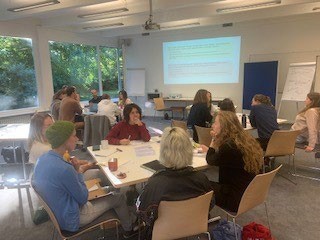
First group work during the introductory lectures (Source: Melanie Mbah).
The second day of the Summer School was dedicated to the topic of climate adaptation in cities and the concrete case study of the city of Emmendingen. Here we started with two substantive contributions, first on the challenges of climate change and opportunities for climate adaptation by Prof. Dr. Hartmut Fünfgeld (University of Freiburg). Then Prof. Dr. Katja Brundiers (Arizona State University) gave us an insight into the concrete implementation of a transdisciplinary project on dealing with heat in the city of Tempe (Arizona/USA). In the afternoon, we got to know the city of Emmendingen and its approaches and challenges regarding climate adaptation. In the meeting room of the town hall of Emmendingen, Stefanie Eißing, Verena Quadt and Karin-Anne Böttcher from the Emmendingen town administration introduced us to the approaches and challenges in the field of climate adaptation. A tour of the city illustrated the topics discussed.
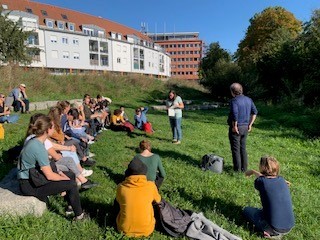
Verena Quadt, climate protection manager of the city of Emmendingen, explains flood protection measures of the city on site (Source: Melanie Mbah).
In the middle of the Summer School, on Wednesday, we devoted ourselves to very different formats of transdisciplinary research. Starting with artistic formats, through real-world labs and regulatory experiments, to Ten Steps and the Theory of Change. For each of these formats we invited experts, namely: The artists Daniel and Jennifer Hörnemann (aka Walbrodt) gave us insight into their artistic formats of transdisciplinary work. Dr. Markus Egermann (IÖR) introduced us to the format of real-world labs using the example of a reallab project in Dresden and Prof. Dr. Dierk Bauknecht (University of Freiburg) illustrated the necessity and possibilities of regulatory experiments. Afterwards, Dr. Pius Krütli showed how the Ten Steps format can be used to design transdisciplinary research that reflects the context and social relevance from the outset and designs the research process accordingly. Dr Jasmin Wiefek (ZTG of TU Berlin) concluded the short introductory round by introducing the format and method of the Theory of Change, with which the focus of a transdisciplinary research project can be continuously directed towards (societal) effects from the very beginning.
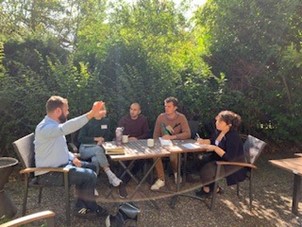
Markus Egermann (IOER) and participants of the Summer School talking about real-world labs (Source: Melanie Mbah).
In the afternoon, the participants of the Summer School discussed in their four groups which formats they would like to use to work on their respective tasks. The day ended with a discussion with representatives of the cities of Basel (Marc Pfister), Freiburg (Verena Hilgers) and Strasbourg (Muriel Temme) on their practical experiences with climate adaptation and the (also country-) specific challenges.
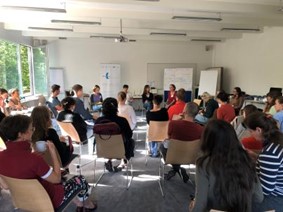
Fishbowl discussion on climate adaptation challenges in Basel, Strasbourg and Fribourg (Source: Mathilde Colin).
Thursday was the group work day, during which the groups approached their topic in the form of discussions, concept development and interviews with representatives of the city of Emmendingen. In the course of the afternoon and until late in the evening, they created a presentation of their results for the joint closing with the city of Emmendingen. The organisational team of the Summer School (Regina Rhodius, Melanie Mbah and Dierk Bauknecht) and Florentin Breton from the University of Strasbourg were available to answer the participants.
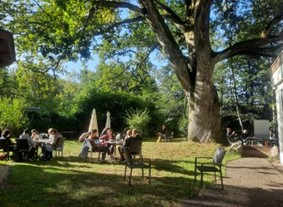
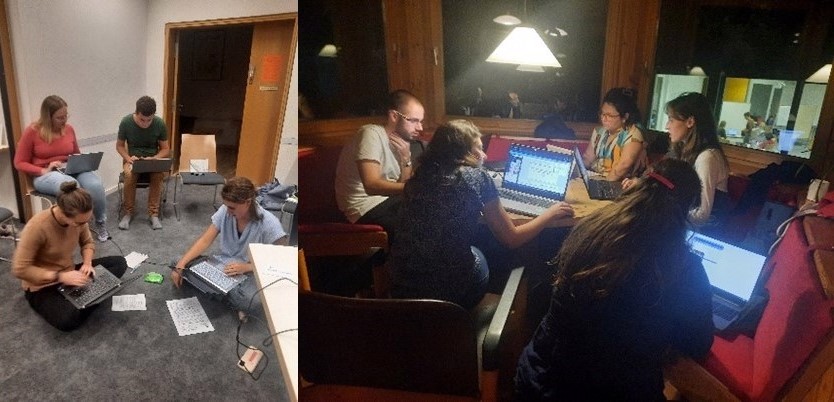
In the afternoon and until late in the evening, the groups prepared their presentations (Source: Regina Rhodius).
The crowning finale followed on Friday, September 29, when the results of the Summer School were presented to the city of Emmendingen through individual group presentations. One group dealt with prevention measures during heavy rainfall and surprised the representatives from Emmendingen with creative suggestions. The group suggested to carry out an awareness campaign in several steps. Based on the state marketing campaign, it proposes the slogan "Nice here. But only with rubber boots". The second group, which focused on engaging vulnerable populations during heat waves, proposes an artistic intervention called "Free(ze) your grandma!" A large refrigerator on the market square should arouse the interest of passers-by and sensitize the younger generation to take care of their grandparents during heat waves, for example by bringing them something refreshing. Groups three and four deal with criteria development and urban densification. Here, based on an artistic intervention - "People as Trees" - an elaborate transdisciplinary approach to criteria development for balancing interests between climate adaptation and climate protection was proposed. Finally, group four showed how the topic of urban densification could be approached transdisciplinarily, among other things with the help of the Theory of Change.
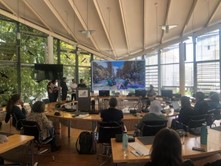
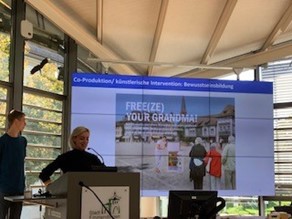
Presentation of the group results in the meeting room of Emmendingen town hall (sources: left Mathilde Colin, right Melanie Mbah).
The municipal representatives present were interested and open-minded about the various impulses from the Summer School for a climate adapted Emmendingen. Especially the intergenerational approach and the artistic interventions were met with enthusiasm.
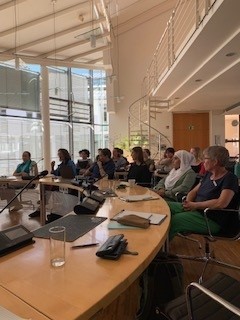
Exciting discussions ensued with the representatives of the Emmendingen municipal administration after the presentations (Source: Melanie Mbah).
The subsequent round of reflections by participants and the organising team as well as the subsequent reports from participants on LinkedIn showed: the Summer School, which was held for the first time, proved to be a great success and was met with positive feedback throughout. Many factors contributed to this: highly motivated participants right from the start, inspiring lectures, the close cooperation with the city of Emmendingen, which allowed practical issues to be dealt with, interdisciplinary and intercultural working groups, intensive coaching of the groups by speakers and the organising team, and the inspiring environment of the Wiesneck Study House.
To LinkedIn reports from participants: Jonas Pyschik, Cora Orlando, Jordan Rydman, Hanna Bonekämper
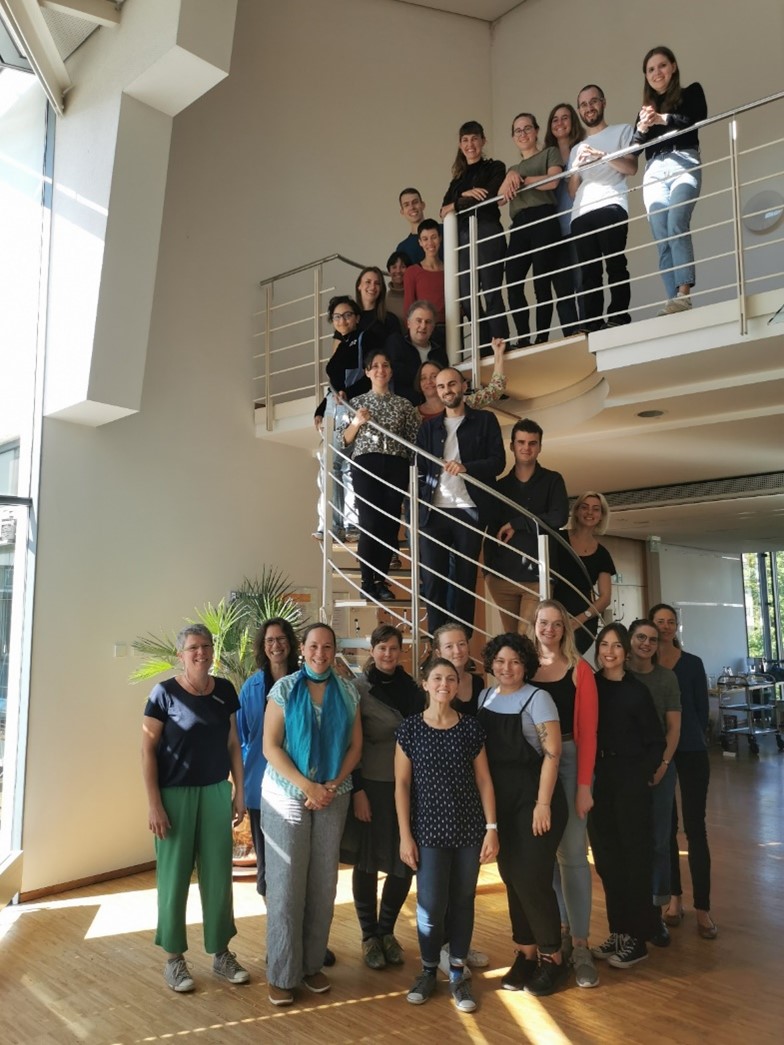
The participants and contributors of the Summer School after the presentations (left Stefanie Eißing, Karin-Anne Böttcher and Verena Quadt from the City of Emmendingen; Source: Verena Quadt)
